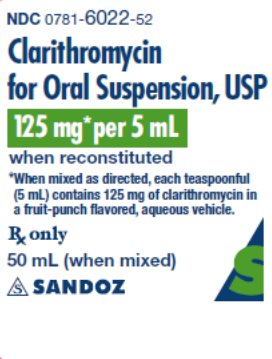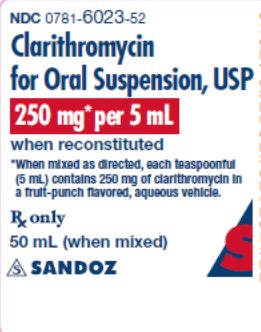Clarithromycin For Suspension while Breastfeeding

What is Clarithromycin For Suspension used for?
I am breastfeeding mother and I am using Clarithromycin For Suspension. Can it have any bad effect on my kid? Shall I search for better alternative?

8.3 Nursing Mothers Caution should be exercised when clarithromycin is administered to nursing women. The development and health benefits of human milk feeding should be considered along with the mother’s clinical need for clarithromycin and any potential adverse effects on the human milk fed child from the drug or from the underlying maternal condition. Clarithromycin and its active metabolite 14-hydroxy clarithromycin are excreted in human milk. Serum and milk samples were obtained after 3 days of treatment, at steady state, from one published study of 12 lactating women who were taking clarithromycin 250 mg orally twice daily. Based on the limited data from this study, and assuming milk consumption of 150 mL/kg/day, an exclusively human milk fed infant would receive an estimated average of 136 mcg/kg/day of clarithromycin and its active metabolite, with this maternal dosage regimen. This is less than 2% of the maternal weight-adjusted dose (7.8 mg/kg/day, based on the average maternal weight of 64 kg), and less than 1% of the pediatric dose (15 mg/kg/day) for children greater than 6 months of age. A prospective observational study of 55 breastfed infants of mothers taking a macrolide antibacterial (6 were exposed to clarithromycin) were compared to 36 breastfed infants of mothers taking amoxicillin. Adverse reactions were comparable in both groups. Adverse reactions occurred in 12.7% of infants exposed to macrolides and included rash, diarrhea, loss of appetite, and somnolence.
Clarithromycin For Suspension Breastfeeding Analsys
Clarithromycin while Breastfeeding
SafeCAS Number: 81103-11-9
It is not excreted in significant amount into breast milk . Commonly used for pediatric treatment which is very well tolerated. Erythromycin is a macrolide that has been related to hypertrophic pyloric stenosis with early exposition. Avoiding use in the first post-partum month would be advisable yet it may occurred while breastfeeding. Be aware of the possibility of false negative results of bacterial cultures when the mother is on antibiotics. Also, diarrheal disease due to imbalance of intestinal flora is possible.
Clarithromycin For Suspension Breastfeeding Analsys - 2
Clarithromycin while Breastfeeding
CAS Number: 81103-11-9
Because of the low levels of clarithromycin in breastmilk and administration directly to infants, it is acceptable in nursing mothers. The small amounts in milk are unlikely to cause adverse effects in the infant. Monitor the infant for possible effects on the gastrointestinal flora, such as diarrhea, candidiasis (thrush, diaper rash). Unconfirmed epidemiologic evidence indicates that the risk of hypertrophic pyloric stenosis in infants might be increased by maternal use of macrolide antibiotics during breastfeeding.

I am nursing mother and I have already used Clarithromycin For Suspension, what should I do?
Clarithromycin For Suspension is safe in breastfeeding and should not create any health problem for your baby but in case you feel any health issue associated with Clarithromycin For Suspension you should contact your doctor or health care provider. Be it pregnancy or lactation you shall keep your doctor informed.
I am nursing mother and my doctor has suggested me to use Clarithromycin For Suspension, is it safe?
Definitely, Clarithromycin For Suspension is safe in lactation for baby. No wonder your doctor has recommended it.
If I am using Clarithromycin For Suspension, will my baby need extra monitoring?
No extra baby monitoring required while mother is using Clarithromycin For Suspension
Who can I talk to if I have questions about usage of Clarithromycin For Suspension in breastfeeding?
US
National Womens Health and Breastfeeding Helpline: 800-994-9662 (TDD 888-220-5446) 9 a.m. and 6 p.m. ET, Monday through Friday
UK
National Breastfeeding Helpline: 0300-100-0212 9.30am to 9.30pm, daily
Association of Breastfeeding Mothers: 0300-330-5453
La Leche League: 0345-120-2918
The Breastfeeding Network supporter line in Bengali and Sylheti: 0300-456-2421
National Childbirth Trust (NCT): 0300-330-0700
Australia
National Breastfeeding Helpline: 1800-686-268 24 hours a day, 7 days a week
Canada
Telehealth Ontario for breastfeeding: 1-866-797-0000 24 hours a day, 7 days a week
